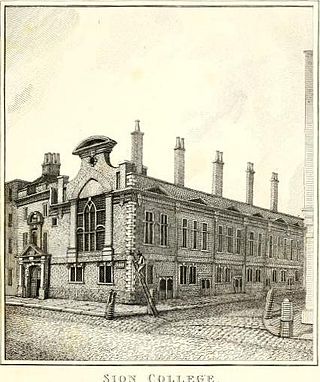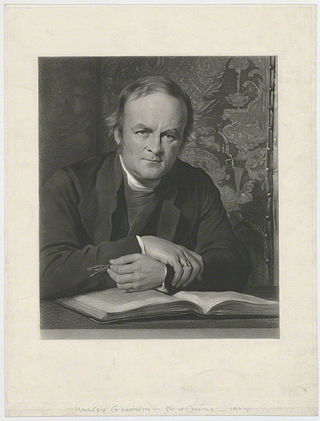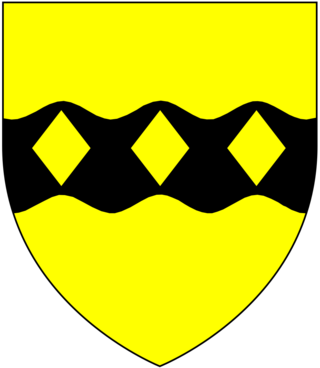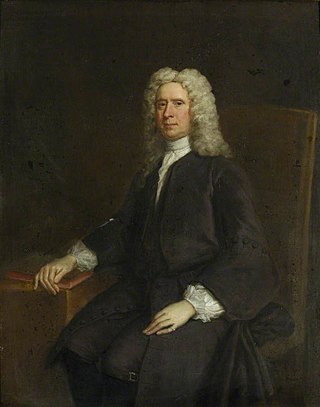Life
He was son of Robert Harvey of Stradbroke, Suffolk. and Joan, his wife. He was educated at Trinity Hall, where he took the degree of LL.B. in 1538, and became LL.D. in 1542. [1]
On 27 January 1550 he was admitted an advocate at Doctors' Commons. He gained a reputation as an ecclesiastical lawyer, and was appointed vicar-general of his diocese by Nicholas Ridley, Bishop of London; and subsequently he was vicar-general of the province of Canterbury. Under Queen Mary he was actively engaged in proceedings against heretics. During the reign of Elizabeth I, he assisted the Commissioners of 1570, engaged in drawing up statutes primarily intended as a check on Puritanism. [3]
In 1567 Harvey procured a lease of the premises in London which, as Doctor's Commons, became the central stronghold of ecclesiastical lawyers. Trinity Hall had control of the buildings and chambers; and these rights, though rendered terminable in 1728, were not abandoned until the incorporation of Doctor's Commons in 1768. [3]

Sion College, in London, is an institution founded by royal charter in 1630 as a college, guild of parochial clergy and almshouse, under the 1623 will of Thomas White, vicar of St Dunstan's in the West.
Richard Sampson was an English clergyman and composer of sacred music. He was an Anglican bishop of Chichester, and subsequently of Coventry and Lichfield.

Sir Herbert Jenner-Fust, was an English judge and Dean of the Arches.
John Haggard was an English ecclesiastical lawyer who was Chancellor of three dioceses.
Arthur William Thomson Perowne was an Anglican bishop in Britain. He was the first Bishop of Bradford and, from 1931, was the Bishop of Worcester.

Henry Parry was an English bishop.
Clement Corbet was an English jurist.
Robert King LL.D. was an English jurist and Master of Trinity Hall, Cambridge.
William Mowse was an English lawyer and Master of Trinity Hall, Cambridge.

Christopher Hampton (1552–1625) was an Englishman who was the Church of Ireland Archbishop of Armagh from 1613 to 1625.

Harvey Goodwin was an English academic and Anglican clergyman, Bishop of Carlisle from 1869 until his death.
William Adams (1772–1851) was an English lawyer most notable for his part in negotiating settlements with the United States in the 1814/1815 period.

Arthur Duck, Doctor of Civil Law (LL.D.) was an English lawyer, author and Member of Parliament.
Ernest Newton Sharpe was an eminent Anglican. Priest in the 20th century.

George Oxenden was an English academic, lawyer and politician who sat in the House of Commons from 1695 to 1698.
William Clerk, LL.D. was an English civil lawyer.
Edward Leeds, was an English clergyman who became Master of Clare College, Cambridge.
William Drury, civilian, third son of John Drury of Rougham, Suffolk, by Elizabeth, daughter of John Goldingham of Belstead, Suffolk.
John Hammond (1542–1589) was an English civil lawyer and politician.
Exton Sayer (c.1691-1731), of Doctors' Commons, London, was an English lawyer and Whig politician who sat in the House of Commons from 1726 to 1731. At his death he held several important legal positions.
This page is based on this
Wikipedia article Text is available under the
CC BY-SA 4.0 license; additional terms may apply.
Images, videos and audio are available under their respective licenses.
![]() This article incorporates text from a publication now in the public domain : Venables, Edmund (1891). "Harvey, Henry (d.1585)". In Stephen, Leslie; Lee, Sidney (eds.). Dictionary of National Biography . Vol. 25. London: Smith, Elder & Co. pp. 87–88.
This article incorporates text from a publication now in the public domain : Venables, Edmund (1891). "Harvey, Henry (d.1585)". In Stephen, Leslie; Lee, Sidney (eds.). Dictionary of National Biography . Vol. 25. London: Smith, Elder & Co. pp. 87–88.





